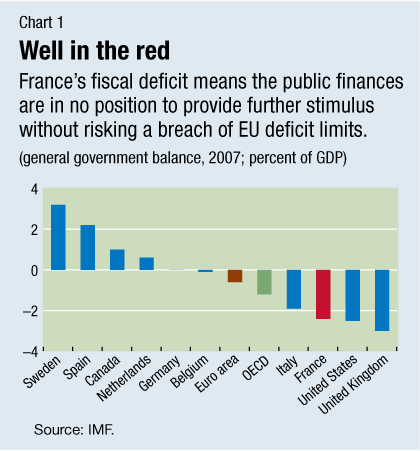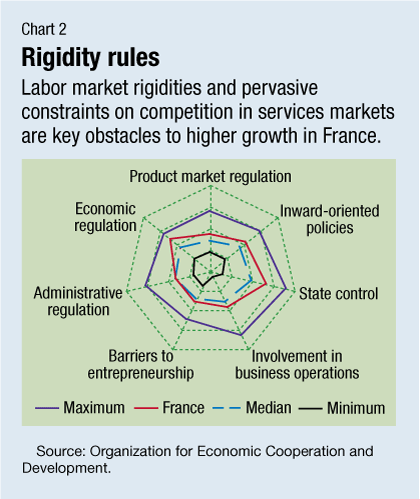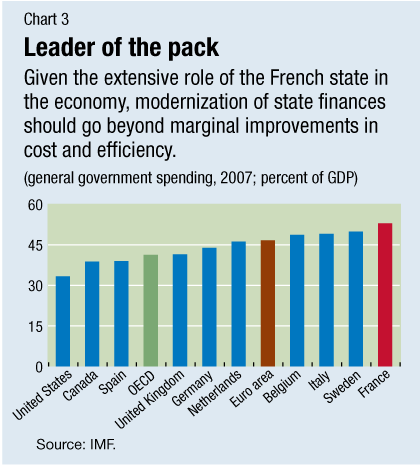
Typical street scene in Santa Ana, El Salvador. (Photo: iStock)
IMF Survey: France and Structural Reforms: Time for a True Rupture
May 15, 2008
- Sobering economic outlook underscores need for action
- Case for comprehensive structural reform is well established
- Fiscal consolidation, modernization could generate major synergies
France has advanced on the path of reforms in recent years, more than is commonly perceived.

Crystal furnace in Baccarat, France: measures to ease workweek limits only indirectly address original distortion, IMF says (photo: Newscom)
ANNUAL ECONOMIC HEALTH CHECK
A year ago, President Nicolas Sarkozy was elected on a reformist platform--that he termed a "rupture" with past policies--to tackle long-standing economic difficulties. The government has pushed through several initiatives, including measures to boost work, investment, and purchasing power, but the needed "critical mass" to boost lagging growth and tackle persistently high unemployment is still to come.
Central to this outcome are several reform projects unveiled recently and focusing on product market competition, the labor market, and tax and expenditure policies. These reforms must be approved—and still others launched—if France is to break away from an overregulated and rigid past.
Testing times for policymakers
The deterioration of the outlook for the global economy and the tightening of financing conditions have clouded economic prospects for France in the near term. Oil and food prices are soaring and households are feeling the pinch. Consumer confidence has reached a record-low level. At the same time, weaker external demand and a strong euro are weighing on exporters, putting a further drag on the economy.
A worsening outlook, however, raises the stakes for reform. While backpedaling on current efforts would exacerbate the country's recent relative economic decline, a critical mass of well-designed reforms should increase economic resilience and unleash a virtuous circle of growth.
At the same time, fiscal policy has little, if any, room to operate in the short term. Tax cuts implemented in the second half of 2007 are already supporting domestic demand. With the deficit at 2.7 percent of GDP in 2007, the public finances are in no position to provide further stimulus without risking a breach of the 3-percent-of-GDP Maastricht deficit limit (see Chart 1)

In addition, an already weak external sector performance adds urgency to the case for structural reforms. Disappointing export performance in recent years is testimony to deep-seated rigidities. Broad reforms addressing these rigidities, along with fiscal adjustment over the medium term, are key to raising future growth and export performance.
Critical mass of reforms
Other countries' experiences and IMF staff research suggest that a critical mass of structural reforms is the most apt to exploit synergies and generate faster and larger payoffs, and may attenuate opposition. Experience also indicates that the payoffs are the largest where market distortions are the greatest. In France, labor market rigidities and pervasive constraints on competition in services markets are key constraints on higher growth (see Chart 2).

The government has appropriately underscored the need to overhaul labor markets. Key initiatives include the reform of job-search services, professional education, and union representation, as well as changes to labor contracts.
However, progress so far has been mixed in important areas. In particular:
• The amendments to labor contracts agreed by social partners fall short of a comprehensive reform, keeping the present, highly limiting juridical framework for labor relations unchanged. Research indicates that reforms that make the labor market more flexible at the margin are ineffectual, tending to artificially increase turnover and only modestly affecting job creation, while having potentially harmful effects on welfare.
• Measures to ease the 35-hour workweek restrictions, including the tax exemption for overtime, only indirectly address the original distortion of the statutory reduction in working time. In addition, they come at a cost to public finances, underscoring the pernicious link between rigid labor market institutions and the budget, as public money is used to alleviate the cost of these rigidities.
Competition policy
The government has also rightly placed competition policy in goods and services markets at the center of its reform agenda. A commission led by French economist and scholar Jacques Attali has identified several reform areas that should help improve economic efficiency, thus yielding lower consumer prices and greater productivity.
A recently proposed law to modernize the economy takes on board many of the Attali Commission's recommendations to improve the business environment, strengthen competition in the retail sector, launch new infrastructure investments, and enhance the financial system. These are all necessary and welcome changes.
But more will be needed to address pervasive entry barriers in some key regulated activities and professions, barriers that create rent-seeking distortions. The implementation of the EU Services Directive, if carried through boldly, provides the opportunity to improve economic efficiency and productivity while reducing prices to consumers.
Achieving fiscal consolidation
The government is also seeking to modernize the state and its finances. It has proposed an overhaul of the civil service and advanced potentially far-reaching, general reviews of expenditure and taxes.
The comprehensive review of public policy, initiated last year, has already identified areas where public expenditure can be reduced and public services improved. Given the extensive role of the French state in the economy, the exercise should go beyond marginal improvements in costs and efficiency to rationalize public functions and refocus on core missions, thus achieving meaningful and lasting reductions in expenditure (see Chart 3).

The forthcoming multiyear budget could thus spell out expenditure targets and means to achieve them on the basis of the review. International experience demonstrates that well-executed expenditure reviews can yield appreciable results, providing sustainable improvements in the fiscal position and in the efficiency of public services, to the benefit of all.
Tangible results from the modernization of the state should lead to fiscal consolidation. At the same time, the fiscal efforts should complement structural reforms. Experience in other industrialized countries has also shown that contemporaneous fiscal consolidation and structural reforms can generate virtuous cycles of improved competitiveness, higher growth, and healthier public finances. Maintaining a steady pace of fiscal adjustment would promote policy credibility and help anchor other policies to modernize the economy.
Comments on this article should be sent to imfsurvey@imf.org







